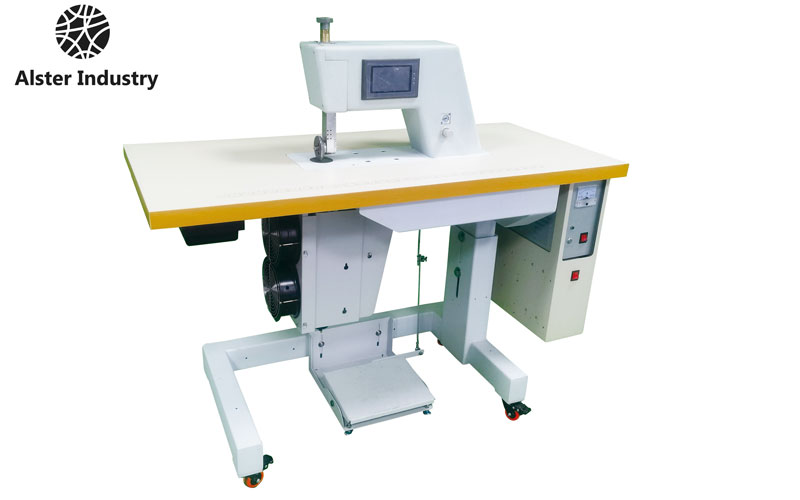In the dynamic and fast-evolving garment industry, ultrasonic welding sewing machines have become a cornerstone technology for producing seamless apparel. This advanced welding technique offers a thread-free, needle-free way to bond synthetic fabrics, opening new possibilities for manufacturers aiming to create high-performance, durable, and aesthetically flawless garments. From sportswear and activewear to medical uniforms and fashion-forward seamless designs, ultrasonic welding technology is reshaping how clothes are made.
In this comprehensive guide, we will explore what ultrasonic welding sewing machines are, why they have become essential for seamless apparel manufacturing, their advantages over traditional sewing, typical applications, and tips for choosing the right equipment.

What Is an Ultrasonic Welding Sewing Machine?
An ultrasonic welding sewing machine uses high-frequency ultrasonic vibrations to generate frictional heat that melts and fuses thermoplastic fibers within fabric layers. Unlike conventional sewing, which relies on needles and threads, ultrasonic welding joins fabrics at a molecular level, producing smooth, strong, and waterproof seams.
How It Works
Ultrasonic vibrations (usually 20-40 kHz) are transmitted through a welding horn.
These vibrations cause rapid friction between fabric layers.
The frictional heat melts thermoplastic fibers, bonding the layers seamlessly.
The bonded area quickly cools, solidifying the seam without needle holes or thread.
This method requires fabrics containing thermoplastic components, such as polyester, nylon, spandex blends, or polyurethane-coated textiles.
Why Ultrasonic Welding Is a Game Changer for Seamless Apparel
1. Truly Seamless and Waterproof Seams
Without needle perforations or thread, ultrasonic welded seams are inherently waterproof and airtight. This is crucial for high-performance apparel like sportswear, swimwear, and outdoor clothing, where moisture resistance and comfort are priorities.
2. Faster Production Speeds
Ultrasonic welding machines operate much faster than traditional sewing machines, enabling manufacturers to increase output and reduce labor costs. The automation of welding parameters ensures consistent quality and minimal human error.
3. Enhanced Durability and Clean Finish
Seams produced by ultrasonic welding are uniform, with no thread fraying or seam puckering. This enhances both the durability and visual appeal of garments, meeting the demands of premium and technical apparel markets.
4. Eco-Friendly and Cost-Effective
Since no thread, adhesives, or chemical bonding agents are used, ultrasonic welding reduces waste and environmental impact. It also lowers material costs by eliminating the need for extra sewing materials.
5. Ability to Bond Complex Fabric Combinations
Ultrasonic welding can join different fabric types and coatings, including laminates and membranes used in waterproof and breathable garments.
Key Applications of Ultrasonic Welding Sewing Machines in Seamless Apparel
Sportswear and Activewear
Performance apparel demands lightweight, stretchable, and waterproof seams. Ultrasonic welding ensures that garments like leggings, sports bras, compression wear, and cycling jerseys offer superior comfort and durability without seam irritation.
Outdoor and Technical Apparel
From waterproof jackets to insulated outerwear, outdoor gear benefits from welded seams that prevent water ingress and heat loss. Ultrasonic welding maintains fabric integrity while delivering robust seam strength.
Swimwear and Underwear
The seamless look is particularly desirable in swimwear and lingerie for aesthetic and functional reasons. Ultrasonic welding provides smooth edges and minimal bulk, enhancing comfort and style.
Medical and Protective Clothing
In healthcare and industrial safety sectors, garments often require sealed seams to prevent contamination and provide barrier protection. Ultrasonic welding is the preferred method for producing disposable gowns, masks, and cleanroom apparel.
Fashion and Seamless Knitwear
Beyond functional applications, ultrasonic welding enables innovative fashion designs with minimal seams, perfect for body-hugging garments, seamless dresses, and avant-garde apparel that push creative boundaries.
Ultrasonic Welding Vs. Traditional Sewing and Other Seam Technologies
| Feature | Ultrasonic Welding | Traditional Sewing | Hot Air Seam Sealing |
|---|---|---|---|
| Seam Type | Seamless, threadless bond | Threaded seams with holes | Adhesive tape applied to seams |
| Waterproofness | Excellent (no needle holes) | Generally not waterproof | Good (depends on tape quality) |
| Production Speed | High | Moderate | Moderate |
| Material Compatibility | Thermoplastic synthetic fabrics | All fabric types | Fabrics with adhesive tape |
| Durability | Strong, durable | Strong, but thread can degrade | Depends on tape and adhesive |
| Environmental Impact | Low (no thread, no adhesives) | Moderate (thread waste) | Higher (adhesives, tapes) |
| Appearance | Clean, smooth | Visible stitches | Taped seams visible |
Choosing the Right Ultrasonic Welding Sewing Machine for Your Apparel Production
When investing in ultrasonic welding equipment for seamless apparel manufacturing, consider:
1. Frequency and Power Output
Higher frequency machines (e.g., 40 kHz) suit delicate, lightweight fabrics, while lower frequencies (20-30 kHz) are better for heavier textiles.
2. Welding Head Size and Shape
Different garment types require various welding horn sizes and shapes, especially for curves and intricate seam lines.
3. Automation and Control
Modern machines feature programmable controls, automatic feeding systems, and quality inspection sensors for consistent production quality.
4. Fabric Compatibility
Confirm your target fabrics are thermoplastic or blends suitable for ultrasonic welding.
5. Maintenance and Reliability
Durable components and easy maintenance reduce downtime and improve productivity.
Tips for Optimizing Ultrasonic Welding in Seamless Apparel Production
Test Welding Parameters: Fine-tune power, pressure, and weld time for each fabric type.
Use Customized Horns: Tailored welding tools improve seam quality, especially on complex shapes.
Combine with Hot Air Seam Sealing: For waterproof garments, reinforcing seams with hot air sealing adds extra protection.
Train Operators: Skilled operators can maximize machine capabilities and reduce defects.
Regular Maintenance: Prevent equipment failure by following a strict maintenance schedule.
The Future of Ultrasonic Welding in Seamless Apparel Manufacturing
Ultrasonic welding machines continue to evolve with:
Integration of Smart Technologies: IoT-enabled machines for monitoring and predictive maintenance.
Hybrid Systems: Combining ultrasonic welding with other bonding technologies.
Sustainability Improvements: Machines designed for lower energy consumption and recyclable parts.
Customization for New Fabrics: Innovations to weld emerging sustainable and smart textiles.
Conclusion
Ultrasonic welding sewing machines are transforming the seamless apparel industry by enabling faster, cleaner, and stronger garment construction without the need for thread or needles. From high-performance sportswear and medical garments to fashionable seamless clothing, this technology enhances both function and design while reducing environmental impact.
For manufacturers ready to embrace the future of apparel production, ultrasonic welding offers an unmatched combination of speed, quality, and sustainability.
About Alster
As a professional manufacturer of ultrasonic welding sewing machines, Alster is committed to delivering advanced, reliable, and customizable solutions for seamless apparel production. Our equipment supports diverse applications, helping manufacturers improve efficiency and product quality worldwide.
